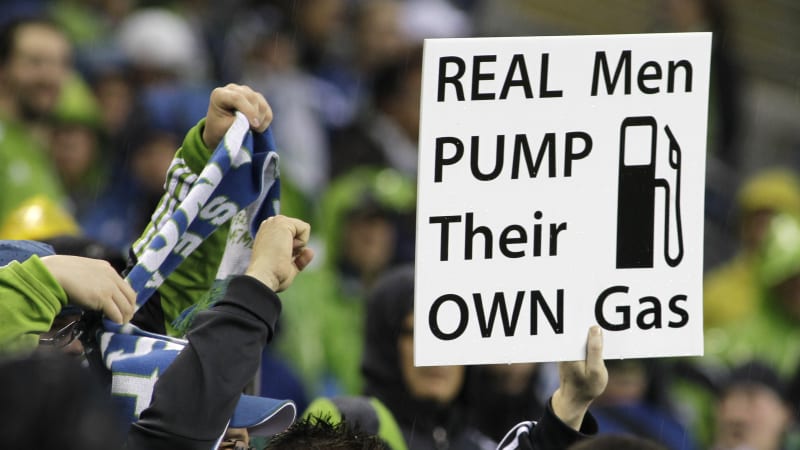Oregon ends its 72-year ban on self-service gasoline

Seattle Sounders FC fans taunt the Portland Timbers during a 2011 MLS match in Seattle in 2011. (AP)
BEND, Ore. — If you’ve visited Oregon (as I am currently), you have likely had the moment of cognitive dissonance in which you hop out of your vehicle at a gas station to fill your tank just as you do anywhere else, then discover (or remember) that you must yield the pump handle to an earnest or sometimes surly gas station attendant who intercepts you and really doesn’t want you stealing their job.
That’s about to change. Oregon lawmakers last week gave final approval to a bill that ends the state’s ban on self-service gas pumps, a prohibition that has been in place since 1951. The change will take affect ASAP after Gov. Tina Kotek signs the bill into law. The Oregonian newspaper says this leaves New Jersey as the only state remaining to require gas station attendants.
Having pump attendants at the ready is a vestige of the days in which most gas stations offered the option of “full service,” even if there was another line of pumps offering self-service. (In those days, the attendant might do more than pump the gas; he would wash your windshield, check your oil, maybe even inflate a tire.) Pumping a flammable liquid was thought to be a bit dangerous for the average motorist.
Oregon’s clinging to the law also had to do with preserving entry-level jobs; that said, in an economy that is enjoying near-full employment, stations have had a hard time filling these jobs, causing motorists longer waits as a few attendants flit between several pumps. As a result, the oil companies have wanted the law changed. The Northwest Grocery Association argued that allowing self-service wouldn’t cost jobs, because understaffing had caused them to shut down half the available pumps anyway.
As a smaller matter, the present system is just plain clunky for motorists, even when staffing is solid. I filled up the other day, and the attendant was very nice; she asked what grade fuel and how much. But then she had to ask if I was in a gas discount plan, and she entered my phone number as I relayed it to her. She then took the credit card. But after all the number-punching, she had forgotten what grade and how much and had to ask again. Did I want a receipt? A car wash? There’s a lot of data entry involved in pumping gas these days.
House Bill 2426 does not do away with pump attendants; it requires at least half the available pumps to be available for customers who value the assistance. (At home in Washington, I once had to show an older woman visiting from Oregon how to operate a pump; she hadn’t a clue.) But the bill allows the other half of the pumps to be self-serve, which restores the old two-tier system most of us grew up with. Best of all, the bill restricts station operators from charging a higher price for full service.
Oregon has been chipping away at the self-service ban for a few years now, in 2015 allowing self-serve pumps at night in some rural counties, then in 2017 in all of them, and then in 2020 during emergency situations like wildfires.
The current bill also does away with some language allowing coin-operated pumps — assuming there ever really were such a thing at stations. The pumps supposedly took $1 coins, and as the Oregonian points out, at today’s prices you’d need pockets bulging with Sacagawea dollars to fill a tank.
Related Video




